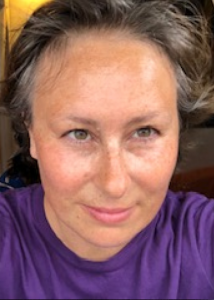Dr. Caroline Lebrec, Assistant Professor of Teaching (French), describes various efforts to promote diversity in Francophone Studies—from developing a new textbook series, designing an experiential learning course, to analyzing the representation of gender in French language.
Textbook Series
“Emphasizing diversity when preparing pedagogical content aims to open minds to plurilingualism, which is positioned against the idea of hierarchy among francophone communities.”


Dr. Caroline Lebrec, Assistant Professor of Teaching (French)
I am working on developing a textbook series that will offer content that is embedded in our global world, without forgetting about the geographical and cultural diversities. It creates bridges among communities of the francophone world, rejecting a purely Eurocentric and patriarchal worldview.
The textbook series is a collaborative five-year project entirely funded by the Canadian Scholars’ Press, which is aligned with an important objective of the Common European Framework of Reference for Languages (CEFR) to enhance local variations of the language.
Our mandate is to develop a textbook concept that adapts the levels of the CEFR to the Francophone world at large, with a specific emphasis on the Canadian francophone context, including indigenous contemporary connections to the French language. Our approach is inclusive, plurilingual and experiential. No other textbook used in higher education offers such a pioneering vision of pedagogy; some have started to embrace the diversity of the francophone world, but still lack a broader inclusive vision (e.g. no indigenous or queer content).
This textbook series will hopefully become the main reference of textbooks used in Canadian universities to support French programs who have already revamped their curriculum to follow the levels of French language proficiency of the CEFR, and to better reflect 21st century higher education based on inclusive values and on the decolonization of the syllabus. This project also has the potential to act as a positive trigger for curriculum renewal and curriculum mapping, with clear examples of how the CEFR can be implemented in higher education in Canadian universities.
The manuscript of the B1 level is finalized and currently in the peer-reviewing process (expected date of publication January 2023). If all goes well with the technical side of the publication process, other textbooks of the series will follow (2024, 2025, 2026).
Experiential Learning Course


VIA Rail train in Jasper, Alberta, Canada.
“In the 21st century, higher education is no longer an ivory tower. Immersive experience should indeed be considered a degree requirement prior to obtaining any language degree.”
Students need to practice the language they are learning in real-life situations. I am developing an experiential learning course titled “La traversée du Canada francophone”, which directly applies the values carried by the textbook series in addressing the diversity of the francophone communities in Canada, while also taking its methodology a step further in offering a hands-on experience to students, with a focus on immersion and exchange in Canada.
The 6-credit summer course is geared towards experiencing the diversity of the francophone communities of Canada outside of Quebec, showing students that there are francophone communities in all Canadian provinces. We will be following the VIA Rail Canada line connecting Vancouver to Toronto, with stops in Vancouver (place of departure), Kamloops, Jasper, Edmonton, Saskatoon, Winnipeg, Sioux Lookout, Sudbury and Toronto (place of arrival). It covers 4460 kilometers and five anglophone provinces (BC, Alberta, Saskatchewan, Manitoba, Ontario).
It is a learner-centered course, meaning students will be engaged in co-creating course content. It will develop many skills targeted by the CEFR and specific to the learning of the French language in a higher education context, and will involve research, presentations, intercultural encounters and reflecting journaling, sociolinguistics, real-life experiences, and active language skills.
During the first half of the semester, students will do research that focuses on community engagement to create data on francophone communities living in anglophone provinces. The second half of the course involves travelling, conducting interviews and reflecting on their community-engaged course experience, to gather stories about how these minorities live, cope and sustain their francophone identity.
Research


“My goal is to build bridges between academic disciplines and to find alternatives to norms and stereotypes.”
My research revolves around concepts of ‘experience’ (through experimental literature and experiential learning) and the philosophical concept of ‘potential’ (through literary forms and inclusive pedagogy).
Analyzing the representation of gender in French language
I believe there is a gender bias in everything, because it is easier to create a world made of norms and to cultivate categories and stereotypes that carry exclusions on one end, and a feeling of power or entitlement on the other end. One thing feminist ideas contribute to society is to reveal that there is more than one gender identity that matters. What the queer community contributes is to give a voice to all gender minorities, beyond the binary scheme of thoughts.
What feminist and queer French writer Anne Garréta is showing in her novel Sphinx (1986) is that the French language can represent inclusivity instead of exclusivity. By choosing not to represent gender identity in her writing, her two main protagonists remain non-gender identified, leaving the reader in limbo (for the best or the worst reading experience), with no possibility of projecting a concrete gendered vision of the protagonists. With this novel, Garréta is queering both the language and the reading habitus.
Similar to George Perec’s novel Avoid (La disparition 1969), Garréta’s novel takes on the paradigm of avoiding arbitrary language norms and explores, instead, the potentialities of expressing gender in the French language. I believe, with Sphinx, Garréta’s work is one of many advocating about the reality of a gender identity bias behind the rules of grammatical gender and reading habitus.
Francophonie at Large
The project “Francophonie at Large” is a perfect example of a French Studies program that revolves around inclusivity, fluidity, and movement. It speaks to issues of diasporas, migration, plurilingualism, race, and LGBTQ topics, and more for all historical periods.
For this project, a group of colleagues and I are working on building resources (corpus, pedagogical activities, etc.) that address the topic of “La francophonie at large” in our courses. With this platform, everyone interested in course design can benefit from other colleagues’ expertise and interest in the topic.
If anyone would like to contact me for further collaborative research, teaching projects, and/or for participating in “La francophonie at large”, please reach out: caroline.lebrec@ubc.ca.


